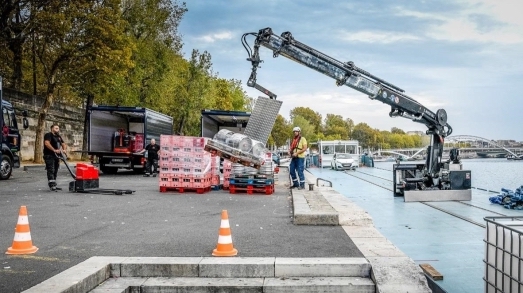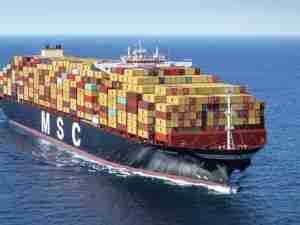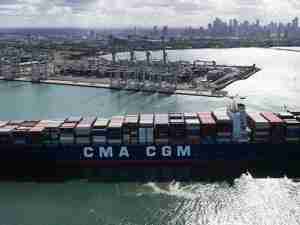Sogestran Logistics has been making scheduled trips via the river to allow OBD Grand Paris vehicles to be reloaded for the delivery of beverage products to Paris cafés, hotels and restaurants. The vehicles are reloaded on the mixed-use dock at Debilly port, located opposite the Eiffel Tower. This solution has received support from the French waterways authority – Voies Navigables de France (VNF) – and HAROPA PORT, which is using its port network to develop end-to-end decarbonised logistics chains.
For OBD Grand Paris, an independent leader in the beverages distribution sector in Paris and its surrounding region with a focus on cafés, hotels and restaurants, this trial stems from a determination to implement more sustainable solutions for urban logistics to address the issues surrounding decarbonisation as well as the need to reduce city traffic. As a major actor in reverse logistics (two-thirds of the volume handled by OBD Grand Paris consists of returnable containers), it is also using this test program to anticipate urban logistics needs for the 2024 Olympics.
Using its teams and urban river logistics expertise, Sogestran Logistics has chartered its ZULU 03 self-propelled barge for twice-weekly runs between Gennevilliers and Debilly ports to reload OBD Grand Paris vehicles.
This Seine-based truck reloading process allows road traffic to be reduced between central Paris and logistics facilities out in the suburbs.

According to their usual delivery rounds, OBD Grand Paris vehicles finish their first Paris delivery run between 8 and 10 a.m. If there is a need to make a second run, they are obliged to make road trips during rush hours between central Paris and the logistics storage site outside the city.
They can therefore avoid these round trips by reloading at the barge waiting for them in the heart of Paris. In this way, river-based logistics make the logistics process considerably more efficient. This in turn means fewer vehicles on the roads, savings of precious time and easier working for the delivery drivers.
Multiple benefits
For Pascal Clément, director of OBD Grand Paris: “The benefits go beyond the purely environmental. This solution helps enhance customer satisfaction (thanks to greater control of the timing of deliveries) and improves the working conditions of the delivery drivers (by cutting the hours spent driving). This also allows us to address to some extent the issue of recruitment in a sector subject to very tight labour supply.”
A city-centre logistics solution allowing shared use of port docks
For Alexis Chapolard, Director, France, at Blue Line Logistics, a subsidiary of Sogestran Logistics: “One of the advantages of ZULU03 is that it has a crane on board that allows it to operate independently since it needs no dockside equipment. Once a delivery has been completed, the dock becomes available once again for other users. In the future, for the purposes of mass goods transit, Sogestran Logistics will have the benefit of availability of Debilly dock for several hours a day.”
Decarbonised urban river logistics
For Antoine Berbain, deputy general manager of HAROPA PORT: “Alongside OBD Grand Paris and Sogestran Logistics, we are extremely pleased with this urban logistics trial involving a new category of goods. We are ready to make this service permanent from 2024, especially with the Olympic and Paralympic Games in mind, starting out from the Gennevilliers multimodal facility and going to the urban ports on the Paris sector of the Seine – not only Debilly, but also Austerlitz – helping in this way to limit road congestion and CO2 emissions.”
Some statistics
• 170 pallets of beverages and 120 pallets of returns (empty bottles and drums) have been carried during the trial as a whole, on the basis of two trips per week (Tuesday and Friday).
• An adjustment phase was needed at the start of the operation, involving transportation of limited quantities of goods. More substantial volumes have been achieved by September and October.
The vehicle reloading process in detail
• On the evening of D-1, delivery of the pallets by OBD Grand Paris to Sogestran Logistics at Gennevilliers port.
• On the morning of D0, departure of the loaded OBD Grand Paris trucks from their warehouses, headed for an initial delivery round in Paris.
• On completion of this first run, they return to the barge in central Paris to unload the returns collected from cafés and take on the goods they need for their second delivery round.
• This means that the vehicle and its driver carry out a second delivery run without having to return to their warehouse outside Paris (at Villeneuve la Garenne). In this way, valuable kilometres of driving time during city rush hours are avoided.
• In some cases, vehicles have been able to make three morning delivery runs by reloading at the barge.
• The ZULU03 and its crew take over from each vehicle the returnable empty containers collected from the customers of OBD Grand Paris.
This project is supported by local government committed to the development of urban river logistics as part of the partnership agreement between HAROPA PORT and Paris City Authority, along with the call for declarations of interest issued with the Greater Paris authority in order to help projects emerge, plus support for experimental operations in the Greater Paris region from the assistance for modal transfer provided by the French waterways authority (VNF).








